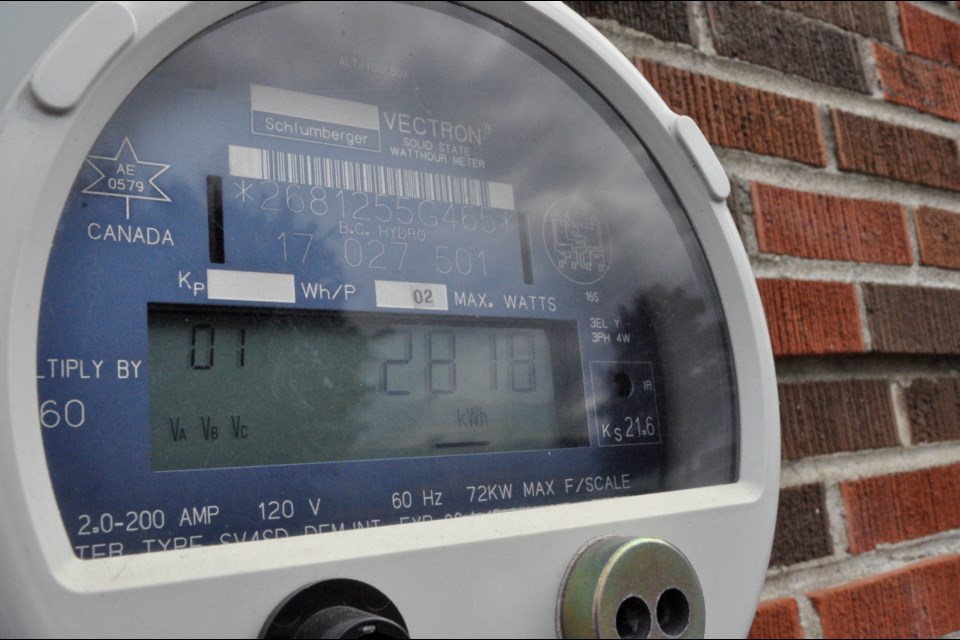The price of electricity will skyrocket 28 per cent over the next five years and add hundreds of dollars to the annual bills of homeowners as part of a long-term rate plan unveiled by the B.C. government on Tuesday.
Energy Minister Bill Bennett announced the increases at the legislature, admitting the hikes are likely to anger B.C. Hydro customers but arguing they come after months of work to stave off much larger increases for the cash-strapped Crown power corporation.
“Will anybody be jumping up and down today saying, ‘Yay, government raised my Hydro rates?’ ” Bennett asked. “No, I’m pretty sure they won’t. But in the context of what everybody in the continent pays for electricity rates, I think it is affordable.”
B.C. Hydro will kick off the increases April 1 with a nine per cent bump to the price of power.
That’s to be followed by six per cent, four per cent, 3.5 per cent and another three per cent in the first five years.
The hike will add $8 a month to an average Hydro bill next year or $96 annually, rising to $25 extra a month by 2019, or another $300 each year.
Bennett said the increase is necessary to allow B.C. Hydro to invest in its power-generating facilities while also paying off billions in long-term debt locked up in what are called deferral accounts.
The Opposition NDP accused the Liberals of misleading British Columbians before the May provincial election, when there was little mention of double-digit power price hikes.
“We said before the election there were significant challenges on the horizon for B.C. Hydro. The Liberals said everything was fine,” said NDP critic John Horgan.
“It was all sparkles and shiny baubles from them. The reality now is, while the premier is away in Asia and the legislature sits idle, British Columbians are getting whacked in the face by liars.”
Bennett’s plan calls for “predictable” rate increases during the next 10 years, including an estimated 2.5 per cent annually from 2020 to 2024.
That means taxpayers could face a 10-year rate increase of almost 40 per cent.
“We believe it is a balanced and responsible 10-year plan,” Bennett said. “It keeps rates as low as possible while B.C. Hydro makes some investments in the system.”
B.C. Hydro will spend $1.7 billion a year on capital projects, said CEO Charles Reid.
The average B.C. home is paying about $3 a day for electricity, which Reid argued — adjusted for inflation — is the same as 30 years ago.
Existing rates are also among the lowest in North America, B.C. Hydro says.
The corporation will shut its Burrard thermal generating plant to save $14 million, reduce its operating costs and eliminate 120 staff positions in the next few days, said Reid.
Bennett said the government will also begin “weaning” itself off hundreds of millions in annual dividend payments that it siphons out of B.C. Hydro and into general government revenue.
However, that weaning won’t begin until after the 2017 provincial election.
The government also promised to tackle B.C. Hydro’s deferral accounts, which the auditor general has criticized as a method of pushing debt into the future to create the appearance of profitability.
Yet even as government tackles deferral accounts, critics note B.C. Hydro will create a new one to handle $1 billion in “rate smoothing.”
That’s just kicking debt farther down the road, said Horgan.
Without it, Bennett said the higher short-term power rate hikes would have been “unbearable.”
Announcement highlights
• Compound electricity rate increase of 28 per cent over next five years.
• Adds $25 a month to average monthly residential B.C. Hydro bill of $110.68 by 2018 — an increase of $300 a year.
• First increase (nine per cent) begins April 1.
• Maximum rate increases of six per cent (2015), four per cent (2016), 3.5 per cent (2017) and three per cent (2018), with hikes of approximately 2.5 per cent annually for another five years.
• The government promises to reduce the annual dividend it pulls from B.C. Hydro in 2018, eliminating it by 2022.
• B.C. Hydro keeps $3 billion for capital projects.
• The Burrard Thermal plant will be closed by 2016 to save $14 million.
• B.C. Hydro will spend $1.6 billion in new Power Smart programs over 10 years.



